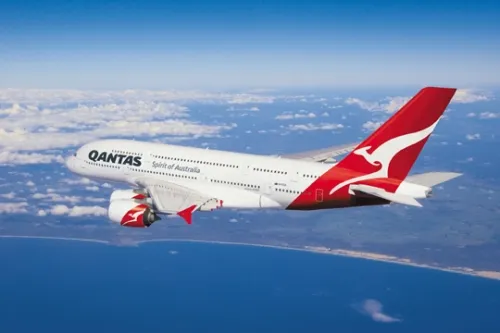
Qantas cancels its 8 remaining A380 orders
Feb 07, 2019

Qantas has announced the cancellation of its eight remaining Airbus A380 orders, a decision reflecting the airline's shift in strategy following the impact of the COVID-19 pandemic on global travel. The A380, once seen as a flagship aircraft for long-haul routes, has faced reduced demand, prompting Qantas to focus on a more efficient fleet. The airline plans to invest in smaller, more fuel-efficient aircraft that better align with current market needs. This move signals a broader trend in the aviation industry as airlines adapt to changing passenger preferences and economic realities in the wake of the pandemic.
In a significant move reflecting its strategic shift in fleet management, Qantas has officially canceled its last eight orders for the Airbus A380. This decision marks a pivotal moment for the airline, as it transitions toward a more efficient and modern fleet. The cancellation of these orders is primarily driven by changing market demands and a focus on sustainability. As Qantas adapts to the evolving aviation landscape, understanding this decision becomes crucial for industry stakeholders and travelers alike.
Reasons Behind the A380 Cancellation
Several factors have contributed to Qantas's decision to cancel its A380 orders. The following points outline the primary reasons:
- Market Demand Shift: The aviation industry has seen a significant shift in passenger preferences, with travelers favoring smaller, more fuel-efficient aircraft that can operate on point-to-point routes.
- Sustainability Goals: Qantas is committed to reducing its carbon footprint. By focusing on newer, more efficient aircraft, the airline aims to meet its sustainability targets while continuing to provide exceptional service.
- Impact of COVID-19: The pandemic drastically altered air travel demand, leading airlines to reconsider their fleet strategies. Qantas, like many others, is recalibrating its future growth plans based on current and projected travel trends.
The Future of Qantas's Fleet
With the cancellation of the A380 orders, Qantas is now pivoting towards a fleet that emphasizes efficiency and versatility. The airline plans to invest in newer aircraft models that are better suited for the current travel environment. Here are key highlights regarding Qantas's future fleet strategy:
| Aircraft Model | Capacity | Range (miles) | Fuel Efficiency |
|---|---|---|---|
| Boeing 787 Dreamliner | 242 - 318 | 7,530 | 20% more fuel efficient than previous models |
| Airbus A350 | 300 - 410 | 8,000 | 25% more fuel efficient than previous models |
Impact on Qantas's Operations
The cancellation of the A380 orders is expected to have several impacts on Qantas's operations:
- Increased Flexibility: Smaller aircraft allow Qantas to be more agile in responding to market changes and passenger demands.
- Cost Savings: With fewer large aircraft to maintain, Qantas can reduce operational costs related to maintenance, fuel, and crew.
- Enhanced Passenger Experience: The new aircraft models offer advanced technology and improved comfort, aligning with Qantas’s commitment to providing an exceptional travel experience.
Industry Response to Qantas's Decision
The aviation industry has closely monitored Qantas's decision to cancel its A380 orders. Analysts and competitors have weighed in on the potential implications:
- Market Trends: Other airlines may follow suit, reflecting a broader trend towards smaller, more efficient aircraft models.
- Competitive Advantage: Qantas's strategic move could give it a competitive edge in the post-pandemic recovery phase by positioning itself as a leader in sustainability and customer service.
- Investor Sentiment: Investors are likely to respond positively to Qantas's proactive approach in adapting its fleet to current market demands.
Conclusion
Qantas's decision to cancel its remaining A380 orders signifies a transformative phase in the airline’s strategy and the broader aviation industry. By focusing on modern, efficient aircraft, Qantas is not only addressing current market trends but also reinforcing its commitment to sustainability and customer satisfaction. As air travel continues to evolve, Qantas's actions will likely serve as a benchmark for other airlines navigating similar challenges. The future looks promising for Qantas and its passengers as the airline embraces a new era of aviation.
For those keeping an eye on the aviation industry, Qantas's move serves as a reminder of the importance of adaptability and forward-thinking in a rapidly changing market. As the airline industry recovers from the pandemic, the focus will increasingly be on sustainability, efficiency, and enhanced passenger experiences, shaping the future of air travel.
Related Articles

Explore Thailand: The Best Islands to Visit for Paradise, Adventure, and Relaxation

The Ultimate Guide to the Best Islands in Thailand for Your Next Getaway

Do babies need passports? How to get a passport for a newborn

How to get a U.S. passport fast: here’s how to expedite the process

What is Mobile Passport Control: 5 reasons why you should use it

SENTRI vs. Global Entry: A detailed guide

Do you need a passport to go to the Bahamas? Let’s find out

Do you need a passport to go to Mexico? A detailed guide

Do you need a passport to go to Canada? We got the answer

Do You Need a Passport for a Cruise: An Essential Travel Guide

Booster Seat Requirements: All the Rules to Follow in Your Rental Car

What Are the World’s Most Powerful Passports, and How Does Yours Rank?

How to Take a Passport Photo at Home: A Helpful Guide

You've got to have heart! Southwest's new livery

Your opinion: Should water be free on low cost carriers?

Young women bolder than guys as solo travellers
